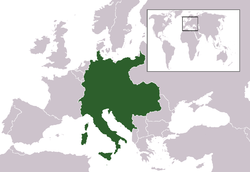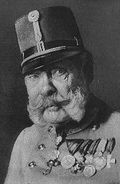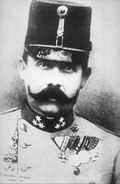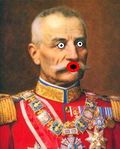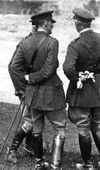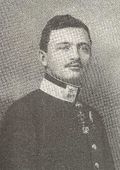Austria-Hungary
Österreich-Ungarn Osztrák-Magyar Monarchia | |||||
|---|---|---|---|---|---|
| |||||
| Motto: Tun wir so, als ob wir miteinander auskommen! Let's all pretend we get along with each other | |||||
| Anthem: Österreich-Ungarn über alles! | |||||
| Capital | Vienna | ||||
| Largest city | Ljubljanabanana | ||||
| Official language(s) | German, Hungarian | ||||
| Government | Monarchy | ||||
| ‑ King/Emperor | Franz Jozef I | ||||
| National Hero(es) | Franz Ferdinand | ||||
| Cobbled-together | 1867 | ||||
| Currency | 1 Funky Franz = 100 fiddly coins | ||||
| Religion | Catholicism, Ethnic Cleansing | ||||
“When one is tired of Austria-Hungary, one is tired of archaic imperialism, mounted-soldiers beating peasants, ethnic strife and handsome Alpine boys bringing you cheesecake balanced on their naked bottoms.”
“Es war sehr schön, es hat mich sehr gefreut!”
Austria-Hungary (also known as The Austrohungarian Empire, Austrohungary, The Most Holy Marriage of Austria and Hungary, and Neville) was created as a drunken bet in 1867 when the Habsburg Emperor Franz Joseph was forced to bet his country's name after losing all his gold sovereigns to Napoleon III. Before the name-change, it was known as simply "The Austrian Empire", "That Empire" or "The Habsburg's Back Garden".
As large, fat and aggressive as its ruling monarch, the empire existed largely for the amusement of the rest of Europe and to give the Serbs someone to hate. It became involved in World War I after the popular Scottish group Franz Ferdinand were shot by the angry young Serbian nationalist and sworn enemy of angular guitar-riffs Gavrillo Princip in 1914. After it lost the war it was broken up into bits - very much a large dry biscuit to an angry Anglo-French fist. The bits everyone has heard of are Austria and Hungary. The other bits are less important.
Formation of Austria-Hungary (4-4-2)
Following the Emperor Franz Joseph's losing his hand at poker, he rejected the suggested new name of "Austria-Hungary-Barney-Magrew-Culthbert-Dibble-Grub," claiming that it would lead to coins in the Habsburg Empire being too big and stamps being three times as long. After much debate, his fellow players agreed on the compromise of "Austria-Hungary" or "Austrohungary". By lucky chance, the Hungarians had been increasingly nationalistic and approved of the name and the additional offer of a new "dual monarchy". Unfortunately, Franz Joseph decided to take the new office of "King of Hungary" for himself, giving him the new title "Franz Joseph, by the Grace of God Emperor of Austria and King of Hungary, two monarchs for the price of one. Word!" (it should be noted that he was also King of Bohemia but had lost the crown in the bath - it might have gone down the plughole, we simply don't know). This greediness upset the many Hungarians who had always wanted a crown and had been hoping that a suitable candidate would be selected from their aristocracy or at least by lottery or wrestling-match. To this day the Hungarians still refer to him as "Franz WMD B. Liars Joseph" before spitting or urinating (or farting, if they've been working in the garden and are a bit "dry").
Geography
The empire consisted of Austria in the west, Hungary to the east and Bohemia and Slovakia to the north. The latter two were generally ignored, although Bohemia was often visited by imperial bureaucrats seeking beer, or men in berets reading dreadful self-indulgent poetry, or sex (or all three!).
In 1908, the empire also acquired Croatia and Bosnia when it was noticed that none of the Great Powers of Europe had bothered to claim them yet. The people of Vienna were delighted since Bosnia was, at the time, Europe's foremost manufacturer of cheesecake and the Austrians have an insatiable appetite for such a dessert. In fact, in 1905, the Austrohungarian navy openly attacked and raided an Icelandic vessel passing through the Adriatic Sea for its cargo of toffee-flavoured cheesecake. The Icelandic captain of the vessel claimed afterwards "I have never seen such a fearsome sight as that of lusty Austrian sailors who hungered for my vessel's sweet contents". On acquiring Bosnia, and with it the Sarajevo Cheesecake Factory (sadly destroyed in the 1914-18 war), dessert-carrying vessels no longer feared the sight of the Austrohungarian naval jack at sea.
Austria-Hungary also incorporated Transylvania and the Austrohungarian army contained a battalion of vampire soldiers (for more see below)
Military
Army
The Grand Army of Austria-Hungary boasted over 200,000 regular troops as well as 1,000,000+ "reserve troops" (or drunks that were found pissing into a shop doorway, press-ganged into signing-up and dressed in khaki with a feathered helmet). This army was renowned throughout Europe as the "second-best army in the German-speaking world". After 1918, it was known as the "second-best defeated army in the German-speaking world".
One battalion was made-up of vampires from the Transylvanian region. Vampires are fucking crazy and killed lots of invaders, only succumbing to the Austrians because of the garlic-heavy sausages they threw at them. The Turks tried to invade Vienna in the 16th or 17th century and all their Janissaries were turned into vampires and now live in Alaska (see movie 30 Days of Night its about the Turkish Janissary Vampires from the Siege of Vienna). The Austrohungarian vampire battalion fought in the early stages of the war with Serbia but was completely destroyed when their commander foolishly carried out a raid in daylight.
The Austrohungarian navy consisted mostly of patrol-boats used to pirate other vessels for delicious cheese-based cakey delights (see above). In the build up to the First World War and in response to the Anglo-German dick-waving contest, the Emperor also ordered the construction of five dreadnaught-class battleships. They were as follows:
- The Schmutzige Schweine
- The Geile Kobolde
- The Haarige Muschel
- The Der Liebes-Stock Des Kaisers
- The Franzosen Können Ihre Frauen Nicht Befriedigen
The Haarige Muschel was sunk by the experimental British submarine HMS Proud Sceptre and the Franzosen Können Ihre Frauen Nicht Befriedigen was completely destroyed by French torpedoes and arrogance. The remaining battleships were decommissioned after the break-up of the Empire following World War I when they became part of the Navy of the Republic of Austria and promptly found themselves on dry land.
Air Force
The Grand Imperial Air Force was actually created in 1890 and consisted of a single hot air balloon. Built in 1890 and launched from Vienna in 1891, she was sadly caught in a tree in Switzerland later that year and promptly packed-away. The Air Force was essentially mothballed as a branch of the armed forces, until 1912, when it was outfitted with some of these new flying machines the Wright Brothers had invented. Whilst Emperor Franz Josef I loved his air force and enjoyed encouraging the pilots to paint their warplanes in outrageous shades of pink and yellow, his successor Karl I refused to believe the things could fly (see Trivia, below). Austria has not forgotten this heritage of air power and currently boasts a large fleet of kites unmatched by any other country.
Alliance with Germany
During a night's hard-drinking with the Kaiser William I of Germany (aka "Der Grosse Willy") in 1879, Franz Joseph signed an alliance with the German Empire stating:
"The German Empire and Austria-Hungary share a common purpose, that of our subjugating Europe and the World to Germanness. In an increasingly un-German world, it is in our interests of our two Great and German nations to form an alliance and hope that slightly-German and German-friendly powers will join us. Willingly, if possible."
This was the beginning of what would become the "Central Best Friends" or "Central Powers" in World War I. They were initially joined by a German-friendly Italy, but that nation became German-phobic and left the alliance after the Germans were appallingly rude about Italian personal hygiene, manliness and cookery.
The empire in World War I
“Before the war, my father told me, "Don't worry. This conflict will be like a night at the opera in Vienna!" He was right: it was bloody, long, terrible and full of screaming men and wailing women.”
“I've had it with these motherfucking Austrians in this motherfucking country!”
“I heard that World War I started when a bloke called Archie Duke shot an ostrich 'cause he was hungry.”
Following the assassination of Franz Ferdinand (even the drummer) the empire moved quickly to punish Serbia and presented her with an infamous ultimatum, threatening war if her demands were not met. These included:
- Serbia to prove how very, very sorry it is by commissioning a portrait of King Peter looking very sorry and saying, via a balloon in the manner of a comic, that he is very, very sorry. This portrait to be hung in every home in Serbia and incorporated into the Serbian flag.
- Serbian police to hand over Slobodan Milosevich for trial to The Hague.
- The King of Serbia to renounce his most favourite jerkin and to hand it over to the Habsburg family (Franz Joseph harboured a longterm envy of King Peter's fine jerkins).
- No more ice cream for Serbians!
- The borders between Austrohungary and Serbia to be redrawn in such a way that a cock appears to be protruding from the former into the latter. Belgrade to be located on the tip of the glans.
- Austrohungarian subjects to have the right to spank the Serbian ambassador in Vienna on request for at least the next twenty years.
- Any and all cheesecake on Serbian soil to be delivered to Vienna immediately as compensation. We like the ones with strawberry sauce best.
The Serbian front
Serbia refused these demands and, in fact, King Peter of Serbia sent a telegram to Vienna claiming to have eaten the official document the ultimatum was sent on and declaring it "as filthy as anything I've eaten from Austria, including yo' mamma's pussy!". The next day, Austrohungarian troops crossed the border into Serbia. Unfortunately, they had to march back again as, in the excitement, they'd forgotten to load their guns and were seen-off by an angry red-faced farmer and his big stick. When they returned to the border, they found that the Serbians had already crossed into Austria and were gleefully shooting their pigeons and ducks. They repelled this invasion and the border fighting continued until the war's end.
The Italian front
The Empire also found herself at war with Italy in the alps. Austria had long-held parts of the Alpine region that Italy felt belonged to her and the Italians resented this unwelcome rudeness. At the outbreak of war, an Italian General stated:
"This is something we've always wanted to do."
Ernest Hemingway participated in this war by joining the Italian army and wrote a book, A Farewell To Those Sausage-Eating Alp-Dwelling Assholes, based on his experiences of shooting Austrohungarian soldiers.
Because of the cold, there was very little actual fighting and on both sides the soldiers mostly drank rum, sang bawdy songs and toasted marshmallows round the ol' camp fire. However, there were some notable snowball fights. The most famous of these has been immortalised in the 1928 Steven Spielberg epic Snowballs of Glory.
In the final months of the war, the Austrohungarian troops also had some "unforgettable" fun when a tank was finally delivered to them. Shortly before the end of hostilities, the Italians devastated an Austrohungarian military base by successfully dropping a mountain on top of it in Operation Schiacci gli Austriaci (Squash the Austrians). The Austrohungarian plans for retalliation, which consisted of firing logged alpine trees into northern Italy using giant crossbows and was called Operation Das habt ihr wohl nicht erwartet, ihr schmierigen Schweine! (You didn't expect this, you greasy swines!), was cancelled, owing to the armistice.
The end of the war
“One day, people will look back on us and say "Yes, they failed. But they tried. And failed. The big failures!"”
In 1916, Franz Joseph I died of cancer of the sideburns and his grand-nephew Karl succeeded him. Unlike his predecessor, Karl was both good at cards and possessed of sensible facial hair. However, both of these much-needed traits came too late to save the ailing empire.
Following the end of hostilities in 1918, Emperor Karl I signed a peace treaty with all his enemies. The joke was on them, though, since he had signed the treaty whilst crossing his immaculately manicured fingers. No one present noticed as he had diverted attention by wearing a pair of fake comedy-breasts. Of his country's involvement in the war and its aftermath, Karl said:
"We're tired, but we enjoyed it. We might have another go in 1930."
Karl had no intention of being the instigator of any such enterprise, though. He abdicated in the face of increasing Republican tendencies.
The end of the empire
Following the end of the First World War and Karl's abdication, the monarchy was overthrown and the Habsburg family were thrown out of the Royal Palace in Vienna in a republican coup lead by Arnold Schwarzenegger, who famously proclaimed:
| “ | Dah! I have defeated you! Dis iz a great day for Austria und Europe. Now Schwarzenegger has all your crowns and your gold and indominable will! Get your azz to Mars! | ” |
Karl Habsburg became a playboy and specialised in driving his Rolls Royce the wrong way down major European roads, of which he later died. His infant son, Otto, grew up to become an Austrian Member of the European Parliament and continued the great Habsburg tradition of being a grumpy old reactionary telling other Europeans what to do. The rest of the family fled to London and set up a scone and tea shoppe which is there to this day, although the people who set it up aren't. Nothing is more likely to put off customers than the sight of the embalmed, grinning corpse of a late member of the Habsburg family standing in the window, as the current owner discovered in 1965.
Following the overthrow of the monarchy, the empire was broken up. Austria became "Austria" and renounced its imperialistic past to groove with the chemicals and lightshows at the discotheque. Hungary pretended to be Japan before the Japanese forced them to stop it and reverted to being Hungary again. Bohemia and Slovakia formed Czechoslovakia, becoming the world's first poo-shaped country. Transylvania became "Transylvaniawood" and churned out dozens of low-budget vampire movies under Count Christopher Lee before merging with Romania in a hostile studio take-over. Bosnia and Croatia were crushed under the Jackboot of Slobodan Milošević, the new Emperor of Yugoslavia, and enjoyed unseen peace.
Famous Austro-Hungarians
- Franz Ferdinand
- Arnold Schwarzenegger
- Bela Lugosi
- Hitler
- Jimmy Carr
- Midge Ure
- Optimus Prime
- Skeletor
Trivia
- Austria-hungary was one of the first subjects of a "Lonely Planet" guide, then just a sheet of paper you could pickup for a ha'penny. The Austro-hungarian guide said "cold, wet, full of peasants. Vienna quite nice when they're not pissing in the street or eating whole pickled frogs. If you have a piece of cheesecake in your pocket, expect violence".
- Austro-hungarian stamps were made of bread.
- Emperor Karl I was so amazed when he first saw the Austrohungrian Air Force flyby on a visit to the Serbian Front in 1917 that he declared that such things could only be done with magic and appointed a Wizardfinder General to "root out this use of unnatural powers in our empire". This post remained in the government of Austria until 1968, although it was by then largely pointless and had been retained because ministers aspired to the "astonishing hat and cape" that accompanied the post.
- Porridge was served by imperial decree on trains throughout the empire. Passengers refusing a delicious steaming bowl could be legally spat at, kicked, slapped, tickled and used as a urinal by the train's extravagantly uniformed ticket-inspectors.
- The young Winston Churchill travelled by train from Vienna to Sarajevo and declared that "no foreign power can force porridge into the British belly". He successfully reached his destination without eating any porridge, although his jaw was broken and his fine suit was in dire need of laundering.
- Despite being long obsolete, the empire managed to participate in the 1958 Eurovision Song Contest as a result of a bureaucratic error. Their unsettling entry My Two Wooden Legs famously caused the young Margaret Thatcher to join the Conservative Party.
- Austria-Hungary should not be confused with the United Stables of Australia-Hungary, which declared independence from Australia and Hungary in 1525 but returned to their respected original states in 1525 v2.0.


